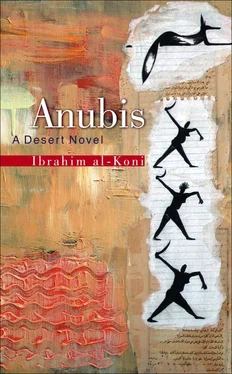Ibrahim al-Koni
Anubis: A Desert Novel
IBRAHIM AL-KONI WAS BORN in Libya in 1948. A Tuareg who writes in Arabic, he spent his childhood in the desert and learned to read and write Arabic when he was twelve. After working for the Libyan newspapers Fazzan and al-Thawra , he studied comparative literature at the Gorky Institute in Moscow, before working in Moscow as a journalist. In Warsaw he edited a Polish-language periodical al-Sadaqa , which published translations of short stories from Arabic, including some of his own. 1Since 1993 he has lived in Switzerland. His novel The Bleeding of the Stone was published in the United States in 2002, at least six of his titles have appeared in French, and at least eight are available in German translation. Representative works by al-Koni are available in thirty-five languages, including Japanese. His published works in Arabic, which are primarily literary, already number into the fifties, with publication dates ranging from 1974, for a collection of short stories, to the present.
Writing in Le Nouvel Observateur , Juan Goytisolo referred to Ibrahim al-Koni as a great artist whose works deserve to be known by European readers and remarked on the inexorable way his characters move from bad to worse, 2since the final disaster comes as a surprise that seems in retrospect inevitable. Jean-Pierre Péroncel-Hugoz, in a review in Le Monde , greeted the release in French translation of L’Oasis Cachée (“The Lost Oasis”) with praise for the universal significance of a work truly presaging the emergence of Arabic literature from its “Oriental rut.” 3
Awarded a Libyan state prize for literature and art in 1996, al-Koni has received prizes in Switzerland for two of his books, including the literary prize of the Canton of Bern. He was awarded a prize from the Franco-Arab Friendship Committee in 2002 for L’Oasis Cachée .
The Tuareg are pastoral nomads who speak Tamasheq, a Berber language written in an ancient alphabet and script called Tifinagh. 4They are distributed through desert and Sahel regions of parts of Libya, Algeria, Mali, Niger, and Nigeria. An estimate from 1996 put their numbers at one million and a half. 5Their affiliation with Islam has been enriched by a vibrant mythology and folklore. The Tamasheq language is also related to ancient Egyptian. The goddess Tanit, revered in ancient Carthage, was once worshiped by the Tuareg along with the male sun god Ragh. Traditional Tuareg society has been marked by caste divisions between nobles, vassals, blacksmiths, and slaves. Tuareg men are famous for wearing veils. Women do not normally wear veils but have headscarves.
In Tuareg lore, Anubi is the archetype for sons of unknown fathers. 6Anubi’s search for his father is legendary among the Tuareg, as is his marriage to Tin Hinan, the founding matriarch of the Tuareg people. 7The oasis featured in the second part of the novel is Targa, known to the Tuareg people as the legendary lost oasis that provides the consonants that give the Tuareg people their name: Tuareg. 8The lost law of the Tuareg people is a Torah-like body of maxims and decrees. It has probably been more influential lost than had it survived physically.
In a book on spirit possession among the Tuareg, Susan J. Rasmussen says: “Spirits of solitude bring illnesses of the heart and soul.” She explains that besides the Islamic jinn, or genies, there are other spirits in Tuareg lore: spirits “of solitude or the wild … who remain in isolated and deserted places.” She observes that “Men’s spirits cause them to become antisocial or to go out and beat people….” 9Al-Koni illustrates each of these points with his character Anubi, who arguably falls prey to these spirits.
The ancient Egyptian god Anubis, with whom Ibrahim al-Koni identifies the Tuareg ancestor Anubi, was the jackal-headed protector of the dead, who was said to be the illegitimate son of Osiris, the god of agriculture, and his sister Nephthys, the wife and sister of Seth, brother of and archrival to Osiris. Osiris was married to the goddess Isis, who was famous for her faithfulness in tracking down the pieces of his body after he was maliciously slain by Seth and for clandestinely rearing their son Horus. Seth, who was eventually defeated by Horus, is traditionally seen as a villain, but since he is also god of the desert he is of special interest to al-Koni, who has written a companion novel with Seth as lead character. 10That Seth was also the god of thunder and lightning is of interest, since lightning plays a key role in Anubis .
Translating al-Koni poses several challenges to the translator. There are issues of technical vocabulary and information concerning flora and fauna; for example, would there normally be more than one adult male gazelle in a group as portrayed in a scene? The answer is that Dama gazelles congregate in large groups that include more than one male — during the rainy season, according to one source, during the dry season according to another. Are there both hares and rabbits in the Sahara? It would seem that there are only hares. Al-Koni employs technical vocabulary of another sort: words he uses in his own special way with his own meanings, and there is a template of Tuareg culture to which the translation must remain true. For example, in the first chapter, the narrator refers to his mother as al-rabba (“the lady”), but in a way that implies that she is a priestess, or in the manner a Christian might refer to the Virgin Mary as “Our Lady of Lourdes.” Furthermore, an adjective used to describe the horizon later turns up describing the nipple on a breast. Maxims embedded in the story should read as though the character actually spoke them and yet retain the solemnity of a sacred revelation. In the final chapter of Part III, the narrator Anubi says, “We must slay our father in order to find him,” a line of dialogue that also sounds like a solemn and prophetic revelation. Finally, the translator needs to remain conscious of the different layers of meaning at play in a novel, for a chase across the desert is also a metaphysical quest.
Notes
1. Ewa Machut-Mendecka, “The Visionary Art of Ibrahim al-Kawni,” Research in African Literature , Fall 1997, vol. 28.3, p. 141 ff.
2. Juan Goytisolo, “Passion dans le desert: Un étonnant roman libyen,” Le Nouvel Observateur , September 9, 1998; review reproduced online as of 6/12/2004 at http://maaber.50megs.com/tenth_issue/books_14f.htm.
3. Jean-Pierre Péroncel-Hugoz, “Al-Koni, au-delà de son islamité,” Le Monde , 11 October 2002.
4. Johannes Nicolaisen and Ida Nicolaisen, The Pastoral Tuareg: Ecology, Culture, and Society , The Carlsberg Foundation’s Nomad Research Project (New York & London: Thames and Hudson, 1997, and Copenhagen: Rhodos International, 1997) Vol. I, pp. 43–45.
5. Ibid., I, p. 19.
6. Ibid., II, p. 722.
7. Ibid., II, p. 722.
8. Ibid., II, p. 722.
9. Susan J. Rasmussen, Spirit Possession and Personhood among the Kel Ewey Tuareg (Cambridge: Cambridge University Press, 1995) pp. 47, 115, 11,129, and 12; as well Nicolaisen II, 519–20, 560–61, and 685–98.
10. Ibrahim al-Koni, al-Bahth ‘an al-makan al-da’i‘ or Aqni‘a Sit al-Sab’a (“In Search of the Lost Place”) (Beirut: al-Mu’assasa al-Arabiya li-l-Dirasat wa-l-Nashr, 2003.)
For the spirit of the father who was a
spirit for all fathers: A.B.
MY EFFORTS TO RESEARCH this legend will fill another whole book even longer than this novel, if I am ever destined to write it.
Читать дальше












